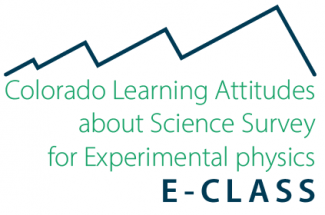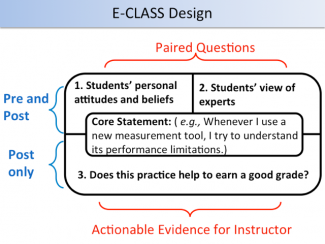What is E-CLASS?
The Colorado Learning Attitudes about Science Survey for Experimental Physics (E-CLASS) was developed as a broadly applicable assessment tool for undergraduate physics lab courses. At the beginning and end of the semester, the E-CLASS assesses students' views about their strategies, habits of mind, and attitudes when doing experiments in lab classes. Students also reflect on how those same strategies, habits of mind, and attitudes are practiced by professional researchers. Finally, at the end of the semester, students reflect on how their own course valued those practices in terms of earning a good grade.
In response to frequent calls to transform laboratory curricula to more closely align it with the skills and abilities needed for professional research, the E-CLASS is a tool to assess students' perceptions of the gap between classroom laboratory instruction and professional research.
A full list of all question prompts can be accessed here.
While the overall validation of the E-CLASS is ongoing, the survey has been preliminarily validated and administered in all levels of undergraduate physics classes. Validation studies have included: iterative student interviews to ensure that students interpret and respond to the survey items as expected; faculty review to establish a baseline for expert-like responses and ensure that all items are meaningful and aligned with instructors' goals for laboratory physics courses; and correlations of students' E-CLASS scores with their final grades in their lab courses.
Can the E-CLASS be customized for individual courses or other scientific disciplines? The short answer is no. The E-CLASS instrument has been validated in its current form, and the addition, removal, or manipulation of any items or formatting on the assessment could potentially invalidate the survey. Changes to the survey would require extensive re-testing to ensure that they did not meaningfully disrupt either students' or experts' responses to and/or interpretation of any items or the assessment as a whole.
Administering the E-CLASS
Any instructor interested in administering the E-CLASS in their physics laboratory course should complete the Course Information Survey prior to their course start date. After completing the Course Information Survey, the process will be as follows:
- Shortly after completing the survey, instructors will receive an email containing a link to the pre-instruction E-CLASS survey that they can distribute to their students at the start of the course.
- We strongly recommend that instructors provide an incentive for students to complete the survey, such as giving it as an assignment or offering extra credit. Even a small incentive typically yields much higher response rates, which will allow the survey results to provide a more accurate picture of your course.
- The survey will remain open for 7 days, at which point instructors will receive a follow-up email containing the names and ID number for all students who completed the pre-survey. It is important that all students complete the pre-instruction survey within the first 7 days of the course or laboratory section; responses received after this cutoff will be discarded.
- At least 7 days before the end of the course, instructors will receive an email containing a link to the post-instruction survey.
- This survey will remain open for 7 days, at which point instructors will again receive an email containing the names and ID numbers for all students who completed the post-survey.
- After the post-survey has closed, instructors will receive a report with aggregate data on their students' responses and comparisons to similar-level courses. This report is designed to facilitate the use of the E-CLASS as a formative assessment tool. An example report can be seen here.
If you are an instructor who has previously administered the E-CLASS and would like to provide feedback on the E-CLASS Instructor Reports, please email us at eclass@colorado.edu.
Contact Us
Please direct your questions or thoughts directly to our research team at: eclass@colorado.edu







